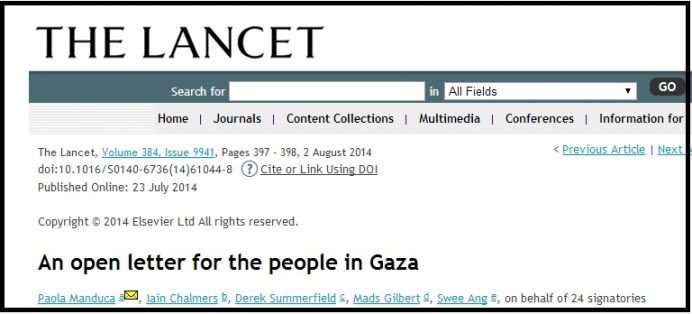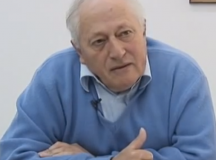Introduction
On 22 July 2014, one of the world’s leading medical journals, The Lancet, published a letter entitled An open letter for the people in Gaza. The authors were Dr. Paula Manduca, Professor Sir Iain Chalmers, Dr. Derek Summerfield, Dr. Mads Gilbert, and Dr. Swee Ang, on behalf of 24 signatories.
There were two unusual features about the letter: first, its length (around 1,500 words) was six times the maximum 250 word limit; second, the journal invited readers to support the letter online. Less surprising was that the Lancet was once again being used to disseminate politicised comment about Israel, and that the comment was profoundly hostile, and unbalanced.
In the UK, where The Lancet is based, a rebuttal was drafted by Dr. David Stone, a professor of Paediatric Epidemiology at University of Glasgow, and circulated. 100 British doctors signed as co-authors, and there were expressions of support for this rebuttal from about 450 healthcare professionals from around the world, including several who have trained or worked in the UK. The Lancet declined – without explanation – to publish this letter.
In view of the strong global support for the document, Fathom is publishing the text of the rebuttal letter below.
We do so to redress the bias that is so evident in Manduca et al’s letter. The authors acknowledge the ongoing Hamas and Palestinian Islamic Jihad rocket attacks on Israel only to dismiss them, challenging ‘the perversity of a propaganda that justifies the creation of an emergency to masquerade a massacre.’ They declare that this aggression is ‘a ruthless assault of unlimited duration, extent, and intensity,’ an onslaught on civilians ‘under the guise of punishing terrorists’ and that the dead are mainly innocents, especially women and children. They present Hamas as a political party which Israel is trying to eradicate, along with resistance to the (Israeli – imposed) occupation and siege. They even urge people of Gaza to ‘reject a temporary truce.’ The authors accuse Israel of trying to destroy Palestinian unity ‘under the pretext of eliminating terrorism’ and allege that targeting of civilians (including children) is deliberate. They claim there is an ongoing massacre involving the use of ‘weaponry known to cause long-term damages on health’ and they also hint darkly about the ‘use of gas.’
The letter concludes with a denunciation of Israeli academics: ‘We register with dismay that only five per cent of our Israeli academic colleagues signed an appeal to their government to stop the military operation against Gaza. We are tempted to conclude that with the exception of this five per cent, the rest of the Israeli academics are complicit in the massacre and destruction of Gaza.’
A key aim of the rebuttal letter was to address the people of both Gaza and Israel, in recognition that there has been damage inflicted on both sides of the conflict.
*
An open letter for the people of Gaza and Israel
Dr. David Stone on behalf of 58 others (and supported by a further 456)
Like your correspondents Manduca et al (‘An open letter for the people in Gaza, 22 July 2014’), we too are appalled by the tragic situation in Gaza. Unlike them, however, our letter has been written on behalf of the people of both Gaza and Israel.
There is no place for either political extremism or selective compassion on the pages of a prestigious medical journal. Manduca et al have performed a disservice both to your readers and the victims on both sides of the conflict by their inflammatory language and blatant bias. Their one-sided condemnation of Israel and implicit approval of Hamas’s resort to violence merely fan the flames of conflict and contribute nothing to the search for peace.
We take strong issue with both the factual and the ethical content of their letter. First, the facts. Israel left Gaza entirely in 2005, removing almost 10,000 Israelis and all of her armed forces, with no intention of returning (leaving state-of-the-art greenhouses worth millions of dollars that Gazan vandals immediately destroyed). The response from Gaza was escalating and unprovoked violence, mainly in the form of rocket attacks indiscriminately aimed at Israeli civilians – including Bedouin communities – in the south of the country. In addition, Hamas ordered the construction of sophisticated underground tunnels enabling militants to attack Israel on the ground to kidnap Israeli personnel. Gilad Shalit was abducted in this fashion in 2006 and held illegally – without International Committee of the Red Cross (ICRC) access – for over five years.
The rocket attacks started in 2001 since when more than 12,000 have been fired, mostly after Israel’s departure. Every one of those missiles constitutes a war crime – as admitted by Ibrahim Khreisheh, Palestinian envoy to the UN Human Rights Council. Following the Hamas takeover of Gaza in 2007, the attacks intensified and the threat grew steadily more serious as the range of the missiles extended towards Israel’s densely populated centre. By early 2014, 27 people had been killed and many more injured.
Israel acted to defend her citizens (as all countries are entitled to do under the UN Charter) first, by imposing a partial military blockade to try to halt the flow of weaponry from Iran and elsewhere into Gaza – a policy that has since been fully vindicated by subsequent events (including the discovery of a large number of concrete-lined underground tunnels Hamas have been building between Gaza and Israel) – and second, by a calibrated and limited military response. Note a key point in the above timeline of events: the military blockade imposed by Israel did not precede Hamas’s rocket attacks but followed them.
When those measures failed, Israel defended her people – as is her right and obligation – by launching two larger-scale operations: Cast Lead in 2008-9 and Pillar of Defence in 2012. Ceasefires were repeatedly broken by Hamas who, emboldened by the lack of international condemnation combined with increasing demands on Israel to relax the blockade, grew progressively more reckless as their military capacity and firepower increased.
Despite a ceasefire in 2012, the early months of 2014 saw Hamas and other groups again firing rockets into Israel. In the wake of the horrendous kidnapping and murder of three Israeli teenagers in June followed by the shocking revenge killing, by a rogue Israeli group, of a 16 year old Palestinian from Shuafat in East Jerusalem, Hamas unleashed an unprecedented and sustained barrage of missiles – at least 3,000 since the start of the current hostilities – at Israeli towns and cities as far north as Hadera and Haifa creating fear and havoc across the country. This incessant bombardment provoked the Israeli government, after some delay, to launch Operation Protective Edge on 7th July 2014.
The purpose of Hamas’s reign of terror was clear: to disrupt normal life in Israel, bring the economy to its knees and, above all, to kill as many Israeli civilians as possible. The last of these was thwarted only by the huge investment by Israel in civil defence measures – early warning systems, bombproof shelters and the Iron Dome missile defence system – that have proven largely effective. That is a major reason for the imbalance of fatalities between the two sides. Without such cover Israeli civilian casualties would have been catastrophic given the deliberate targeting by Hamas of urban, civilian centres in Israel.
Israel’s defensive precautions contrast strikingly with the activities of Hamas, who have misappropriated vast sums of international aid monies despatched to Gaza for development and used them instead to build an elaborate infrastructure of tunnels, weapon stores and rocket launchers embedded within densely populated urban centres. Prior to the current conflict, Hamas boasted of having amassed an armoury of over 10,000 missiles, all with the purpose of harming Israelis. This strategy of armed struggle against Israel has predictably rebounded on Gazans, who have suffered death, injury and hardship as a consequence.
None of this human misery would have occurred had Hamas chosen to develop Gaza as a healthy and peaceful community following Israel’s departure in 2005 rather than as a renewed launching pad for violence directed at Israel. And a large number of casualties resulting from recent events would have been avoided had Hamas, like Israel, accepted the various ceasefire proposals before and during the ground operation.
Many readers will be surprised to learn of an almost unreported fact: that for many years, including the current intensified conflict, Israel has permitted essential supplies such as food, clothing, medicines, fuel and electricity to be transferred daily from Israel to Gaza. In recent weeks, Israel has continued to facilitate the entry of Gazan patients to Israel for specialist medical care (including two relatives of the Hamas Prime Minister), and has established a field hospital adjoining Gaza to enable injured Palestinian victims of Hamas’s war on Israel to be treated by experienced trauma surgeons. Those are not the actions of a country determined to inflict ‘collective punishment’ or ‘siege’ on a neighbouring people.
Neither the ‘siege’ nor the ‘occupation’ (Hamas’s code for the whole of the State of Israel) is the root cause of this latest conflagration nor indeed of the Palestinian-Israeli conflict. That is to be found in the Hamas charter which completely rejects any claim to Jewish self-determination and excludes any peaceful resolution of the conflict based on mutual recognition and territorial compromise.
We are dismayed at Manduca et al’s unsupportable allegations about ‘massacres’, ‘targeted weaponry used indiscriminately and on children’ , the ‘use of gas’ and ‘denial of entry for international humanitarian convoys.’ This is a malicious demonisation of the Israeli defence forces who are fighting a defensive war against a terrorist organisation in the most difficult circumstances of urban warfare imaginable with its consequent risks to non-combatants caught in the crossfire. As confirmed by international and independent experts, including the UK’s Colonel Richard Kemp, Israel does not target civilians and takes exceptional care to minimise civilian casualties, often exposing her own troops to greatly enhanced risk as a consequence.
Manduca et al, while harshly criticising Israel, appear to offer understanding and even endorsement of Hamas’s extreme policies and behaviour. This is an extraordinary position for healthcare professionals to adopt. Most readers will be well aware of the true nature of that organisation. It is far from being a ‘political party’ seeking to promote ‘resistance to occupation and siege.’ It is a repressive, homophobic, misogynistic and anti-Semitic group of religious fanatics which is committed, with chilling openness, to Israel’s destruction and the murder of most of her inhabitants. These aspirations are far from mere rhetoric but have been pursued with merciless cruelty over many years, in the process murdering over a thousand Israeli civilians, injuring many more and traumatising an entire nation.
Nor does Hamas baulk at sacrificing its own civilians, by exploiting young children as suicide bombers or instructing people to remain on rooftops, despite Israeli warnings of an impending strike, launching attacks from hospitals and ambulances, and using schools and mosques as weapons depots and launching sites. When they proclaim ‘we love death more than you love life’ they mean it. Little wonder it has been declared a terrorist organisation by the US and the EU as well as Israel.
What kind of ethical code leads doctors and scientists to absolve Hamas, an authoritarian terrorist organisation, from blame for this unnecessary conflict while simultaneously heaping virulent condemnation on Israel, a liberal democracy attempting to protect its citizens – Jews, Arabs, and others – from the consequences of aggression? And for the authors to impute to 95 per cent of Israeli academics complicity ‘in the massacre and destruction of Gaza’ because they didn’t sign a document is not only patently unscientific but a breathtakingly crude example of modern McCarthyism.
We call on doctors and scientists of goodwill around the world to reject Manduca et al’s gross partisanship and substitute for it a far more accurate, balanced, just and humane approach to the heart-rending tragedy that has engulfed both Palestinians and Israelis for far too long. That approach must comprise two urgent components: first a genuine and lasting ceasefire that can be properly implemented and sustained, and second, a return to negotiations with parties committed to achieving the only sensible and fair outcome to this hundred year war – two states for two peoples living side-by-side in peace and harmony.







































